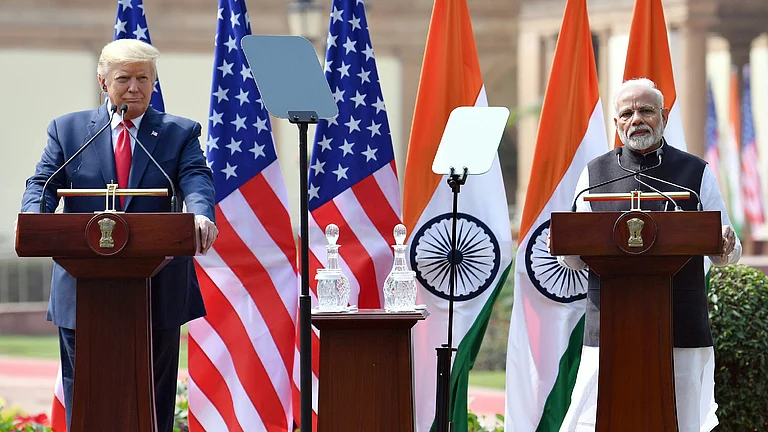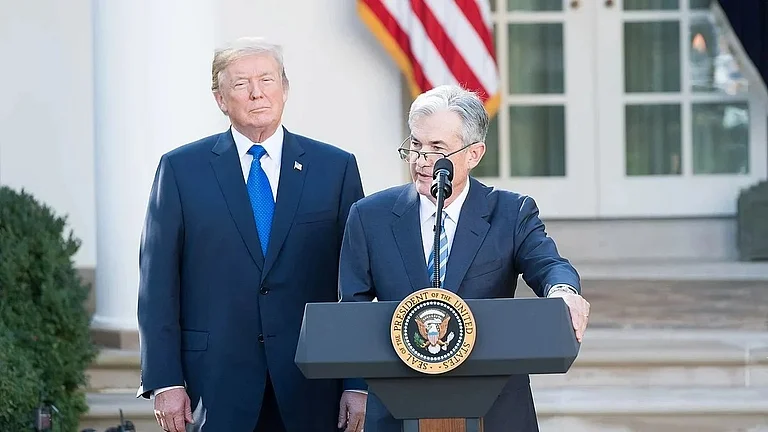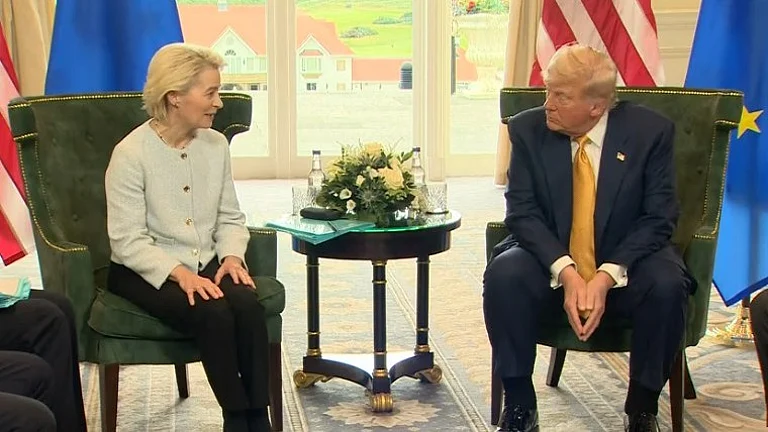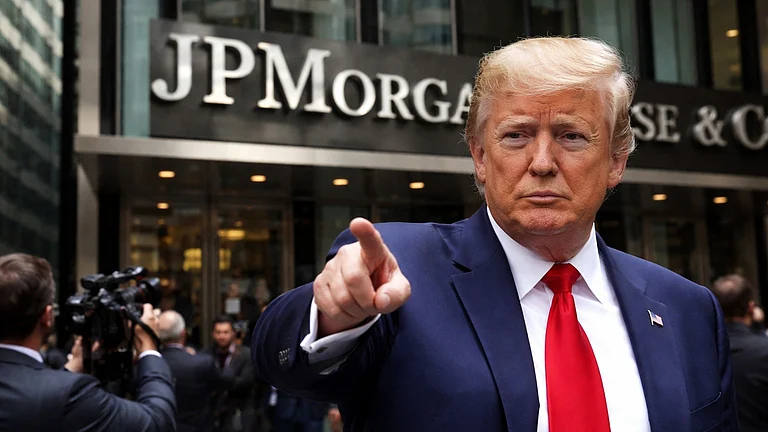True to his earlier media handling tactics, US President Donald Trump has again filed a lawsuit against the financial newspaper The Wall Street Journal, its owner Rupert Murdoch, and at least two of its reporters.
The defamation case filed in Miami federal court claims that the newspaper's report from July 17 linking Trump with late sex offender Jeffrey Epstein defamed the president and caused him to suffer "overwhelming" financial and reputational harm. It demands at least $10 billion in damages from the newspaper, its owner Dow Jones, their parent company News Corp, its CEO Robert Thomson, ultimate owner Rupert Murdoch, and two reporters, Khadeeja Safdar and Joe Palazzolo.
While suing media is not new for Trump, experts say as a president, he is the only one who has gone against news outlets.
"No sitting president in modern history has sued a media outlet or reporter for defamation, until Trump. While public officials have complained about press coverage, they have historically avoided courtrooms, recognising the constitutional protections of the press and the strategic danger of being perceived as silencing critics," said Ken Sterling from Los Angeles-based law firm Sterling Media Law. He is also a professor of Digital Media at the University of Southern California. Sterling adds that there have been isolated examples of governors or local officials suing for defamation, but nearly all were dismissed early on First Amendment grounds.
Experts also note that the $10 billion damage demand is unprecedented in nature, as it exceeds a $1.5 billion judgment against conspiracy theorist Alex Jones and Fox News' settlement with Dominion Voting Systems for $787.5 million.
But for Donald Trump, it's not the first time. His fight with US media has been public since his first term when he used to call any left-leaning US media organisation "fake news." But leading up to the 2024 election, the fight has escalated to new heights. Just before the presidential election, he filed cases against Disney-owned ABC News and Paramount's CBS. Both companies ended up settling the case, though at the time many experts had pointed out the allegations had little to no substance. But as Sterling told us, "making peace with the most powerful person on earth is a very wise move and one that I would advise any client to make."
So, is this a new normal for US media? For that, let's try to understand Trump's style of navigating so-called "the fourth pillar" of democracy.
Why Trump is suing WSJ
On July 17, The Wall Street Journal published an article titled "Jeffrey Epstein’s Friends Sent Him Bawdy Letters for a 50th Birthday Album. One Was From Donald Trump."
The report just added a new layer to what is already public knowledge: Donald Trump was a friend of Jeffrey Epstein, who was later accused of child sex trafficking. The president has repeatedly said he had a fallout with the late sex offender before his legal troubles started in 2008. In his first term, when Epstein was once again arrested in 2019, Trump said, "I knew him like everybody in Palm Beach knew him," and "I was not a fan of his, that I can tell you."
The Journal report, citing sources, claimed that a 2003 birthday album created by Ghislaine Maxwell (convicted of helping Epstein's sex trafficking) for Epstein’s 50th birthday included a provocative letter allegedly from Donald Trump. The letter, as per the newspaper, featured bawdy language and a drawing of a naked woman, with Trump’s signature. The album, which included poems, photos, and jokes from Epstein’s network—such as billionaire Leslie Wexner and attorney Alan Dershowitz—was allegedly assembled before Epstein's first arrest in 2006. Justice Department officials have reviewed the album in the past, though it's unclear if it was part of a recent document review, the newspaper said.
The report came out amid mounting scrutiny of the Trump administration from his own "MAGA" supporters, who believe there is an alleged list of rich clientele of Epstein with the US Department of Justice. As per conspiracy theories floating in online MAGA forums and right-wing US media, this list was hidden from public view by earlier administrations after the sex offender committed suicide in his cell at the Metropolitan Correctional Center in New York City on August 10, 2019.
Many of Trump’s supporters and his cabinet members, before his election, claimed that in his second term he would release those documents. But these hopes were dashed earlier this month, as the DOJ in a memo said that investigators found no incriminating “client list” or evidence that Jeffrey Epstein blackmailed prominent individuals. The memo also reaffirms that Epstein died by suicide in 2019, consistent with past autopsy results and official investigations.
The DOJ also released 10 hours of surveillance footage showing no one entered Epstein’s cell on the day of his death. Officials concluded that no further disclosures are warranted.
The findings drew backlash from conservatives and influencers. So on July 17, the US president finally gave in and ordered his Attorney General Pam Bondi to ask a Manhattan court to release grand jury testimony about Epstein.
But not before he wrote on his social media platform, "We have just filed a POWERHOUSE Lawsuit against everyone involved in publishing the false, malicious, defamatory, FAKE NEWS 'article' in the useless 'rag' that is, The Wall Street Journal. I hope Rupert and his 'friends' are looking forward to the many hours of depositions and testimonies they will have to provide in this case."
Later, WSJ owner Dow Jones said, "We have full confidence in the rigor and accuracy of our reporting, and will vigorously defend against any lawsuit."
"Donald Trump's lawsuit against The Wall Street Journal has a lot in common with previous legal actions the President has taken against media outlets like ABC News and CBS’s 60 Minutes. This latest lawsuit is serious business and could have serious, if not disastrous, consequences for the First Amendment," said Michael Fahey, Founder and CEO of Fahey Communications, a Massachusetts-based public relations company. Fahey has over 13 years of experience in US media working across local news outlets and PR agencies.
"The lawsuits are not an isolated phenomenon. They are part of a broader legal push from recent years—especially under the Trump administration—that has intensified against media institutions. Trump has sued or threatened to sue a number of times," he adds.
According to Ken Sterling, all three cases are "somewhat similar in terms of the structure and legal theory of the filing."
"Trump has alleged defamation. The legal burden remains steep: as a public figure, Trump must prove actual malice, meaning the outlet knowingly published false information or acted with reckless disregard for the truth. Each case turns not just on the content, but on the editorial process and intent—both are challenging to prove," he notes.
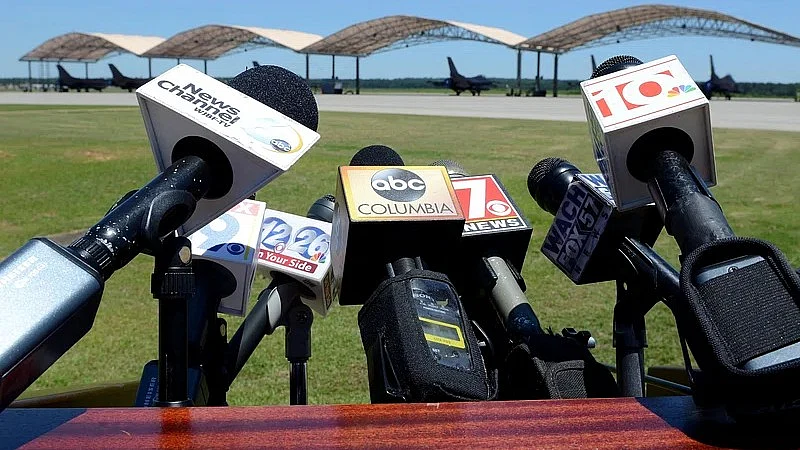
ABC, CBS' Settlement with Trump
Trump's first case against a major news outlet was in late 2024, when he filed a $20 billion suit against CBS and its parent company Paramount, alleging that their show 60 Minutes "deceptively edited an interview with then–Vice President Kamala Harris to mislead viewers." The case was filed under Texas’s Deceptive Trade Practices Act. Post-election, Paramount ended up settling the case for $16 million with no apology. The money will be paid to Trump’s future presidential library.
The second lawsuit targeted ABC News and anchor George Stephanopoulos over comments related to Trump’s civil liability in the E. Jean Carroll case [Carroll, a former Elle magazine columnist, accused Trump of sexually assaulting her in a Manhattan department store dressing room in the mid-1990s. Trump denied the allegation, claiming he had never met her and that she was “not his type.” In response, Carroll filed a defamation lawsuit which she won.]. Also filed in late 2024, this case was settled by December with a $15 million payment and a public apology from ABC.
For ABC, there are still no reports or official comments on why they settled the case, but for Paramount, experts say it was related to its pending merger with Skydance. Post-settlement announcement earlier this month, Senators Elizabeth Warren, Bernie Sanders, Edward Markey, and Ben Ray Luján described the move as a “bribe” threatening journalistic integrity and called for full regulatory scrutiny of the merger.
Although Paramount insists the settlement was a legal decision independent of the merger.
The alleged casualty of this fight became The Late Show and its anchor Stephen Colbert. A long-time Trump critic, Colbert on his show had called Paramount’s $16 million payment to Trump a “big fat bribe.” A day later, the company said it was cancelling the show post its current contract conclusion in May 2026.
While Paramount said it was a “purely financial decision," claiming they were projected to incur a $40 million annual loss from the show.
On Friday, the Writers Guild of America called for an investigation by New York’s attorney general, calling the move “sacrificing free speech to curry favor with the Trump administration as the company looks for merger approval.”
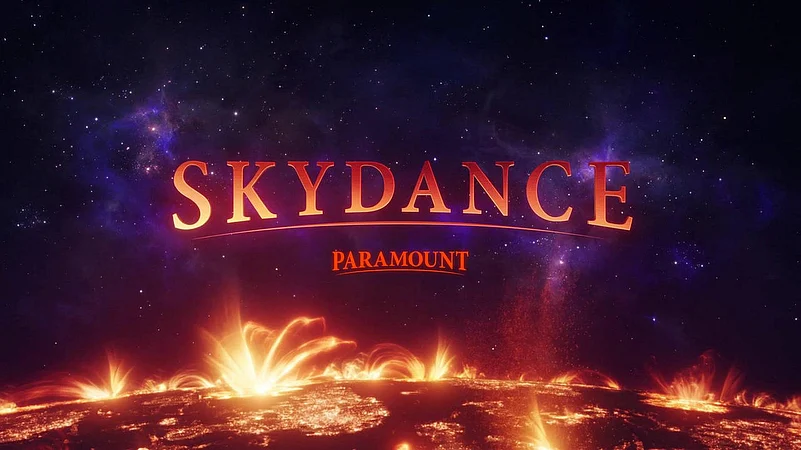
Trump vs Media: Who Wins?
"These deals may be driven by corporate strategy (e.g., merger approval), but they risk emboldening future lawsuits and undermining editorial independence. When newsrooms are overridden by boardrooms, it weakens the press’s ability to hold power to account, especially when that power is the President of the United States," said Sterling. He added that settlements are "an effort to mend fences AND it was a survival move."
Sector analysts also see that. According to S&P Global's January report, total ad growth in US media "is primarily driven by the expansion of digital advertising, which we expect will grow at a high-single-digit percentage rate, while traditional media formats such as television, radio, and print face continued secular declines."
They expect overall advertising in the US to grow 4.3% in 2025, although trends continue to diverge between legacy media and digital.
"The former (with the exception of outdoor) should continue its mid-single-digit percentage decline as audiences shrink and advertisers find alternative media to reach consumers," the report added.
On Disney's aim to achieve 10% operating income margins by 2026 and double-digit margins longer-term, the credit rating agency said, "This level may be out of reach for legacy media companies with smaller global scale and greater dependence on high-priced sports programming."
Casualty: Free Speech Protection?
But with the pressure campaign from the Trump administration continuing, experts see the above situation persisting or even getting worse. Other than the lawsuits, the Trump administration has also pressured media by cutting funding and giving access to alternative platforms. Soon after taking office, Trump changed the composition of his press briefing room. He allowed "new media, podcasters and influencers" to come to the White House and ask questions in regular press briefings.
Now, on many occasions, media critics have pointed out that these reporters from these outlets get the chance to ask the president and White House Press Secretary Karoline Leavitt questions that are favourable to them.
Further, on May 1, President Trump issued an Executive Order, instructing the Corporation for Public Broadcasting (CPB) and other federal agencies to halt all direct and indirect funding to American public broadcasters NPR and PBS, citing what he called “persistent bias” in their programming. The order labelled taxpayer support as “corrosive to journalistic independence,” marking a sharp escalation in Trump’s long-standing criticism of public media.
NPR and PBS leadership condemned the action as "blatantly unlawful," arguing the president lacks authority over CPB, a nonprofit corporation created by Congress and protected from executive control. Both organizations pledged to challenge the order in court, citing First Amendment concerns and the Public Broadcasting Act.
Last week, the Republican Party-led Congress approved President Trump’s request to cut $9 billion in spending, targeting public broadcasting and foreign aid. The move, passed narrowly in both chambers, uses a rarely invoked presidential authority to rescind already approved funds. The Corporation for Public Broadcasting (CPB) stands to lose $1.1 billion over the next two years, its entire scheduled funding. The White House claims the public media system, including NPR and PBS, is politically biased and a non-essential expense.
The cuts have sparked bipartisan concern, especially over their impact on over 1,500 local public media stations that rely heavily on CPB grants. While some funding may be redirected to support Native American radio stations, many lawmakers argue that most local stations will be left vulnerable. Democrats tried to block the measure, and even some Republicans expressed discomfort, but the bill is now set to become law with Trump’s signature.
Further, now even Democratic Party leaders are filing lawsuits against media. Like California Governor Gavin Newsom, who has filed a $787 million defamation lawsuit against Fox News and host Jesse Watters in Delaware, where Fox is incorporated. The suit centers on a June segment in which Watters accused Newsom of lying about the timing of a phone call with President Trump, claiming the governor refused to take a call related to the National Guard deployment in Los Angeles.
Newsom’s legal team argues that the network used a manipulated clip and misleading on-screen caption (“Gavin lied…”) to falsely portray him, undermining journalistic ethics.
"This exemplifies the kind of recent escalation that can be seen in right-wing and left-wing politicians making use of the courts against the press," said Fahey.
Another example includes Sarah Palin’s defamation case against The New York Times. Palin, the former Alaska governor and 2008 Republican vice-presidential candidate, filed a defamation lawsuit against NYT in 2017. She claimed the newspaper falsely linked her political action committee’s imagery to the 2011 mass shooting that injured then-Congresswoman Gabby Giffords. The Times had published an editorial suggesting a connection between a map used by Palin’s PAC — which showed crosshairs over certain districts — and the shooter’s actions. The paper later corrected the editorial, admitting it had no such evidence.
Palin argued the mistake damaged her reputation and was driven by political bias. However, courts repeatedly found The Times did not act with "actual malice" — the high standard required to prove defamation of a public figure. In 2022, a jury sided with the newspaper, and in 2025, a second jury again ruled in favour of the Times. Palin lost the case but may still pursue an appeal.
"Isolated examples pop up from time to time at the state level, but none are suing the press with anywhere near the frequency or legal aggression that Trump is. Meanwhile, America’s press protections remain as robust as they’ve ever been," Fahey explains. He adds that the settlements that these lawsuits result in—again, not in themselves signs of guilt—seem to be quieting the media a little. It certainly isn't a comfortable environment for the press to be operating in, whether for media outlets or for the journalists employed by them, he notes.
For Sterling, they send a signal about the risks media companies may face in high-profile defamation cases, and other news outlets should be concerned about these types of lawsuits from President Trump.










